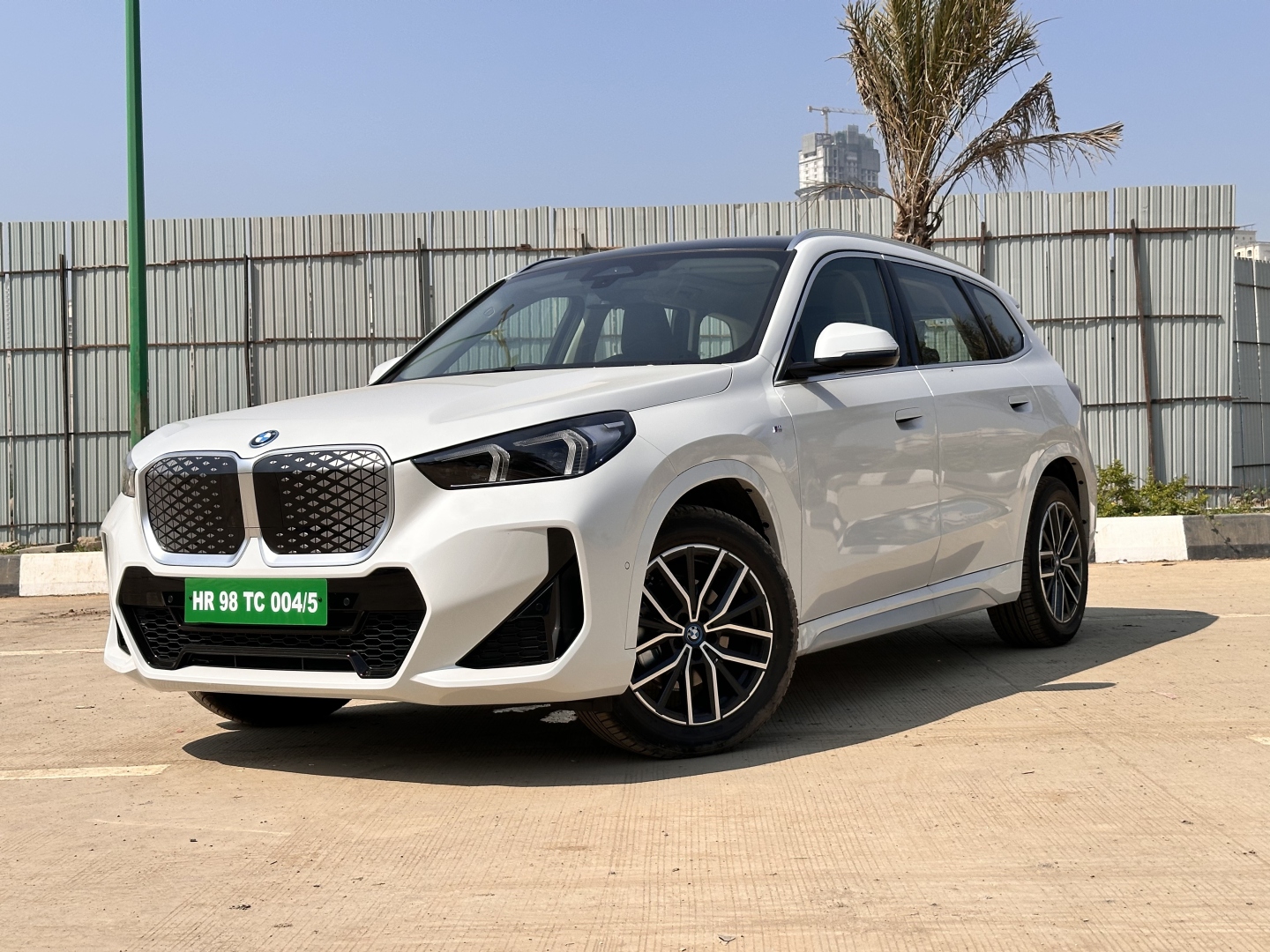
BMW's push into the electric vehicle market took an interesting turn with the launch of the iX1 Long Wheelbase (LWB) at the Auto Expo 2025. Targeting a wider audience by making luxury EVs more accessible, BMW has taken a calculated gamble. Locally assembled in India, the iX1 LWB boasts a significant advantage in its rear passenger space, and a competitive price tag of Rs. 49 lakh (ex-showroom), surprisingly undercutting its ICE-powered counterpart, the X1. However, the pursuit of affordability often involves compromises, and the iX1 LWB is no exception. Does the iX1 LWB offer a compelling entry point into the luxury EV segment, or are the trade-offs insignificant to ignore?
Exteriors
As its name suggests, the 'L' in the BMW iX1 eDrive20L signifies a longer wheelbase, extended by 108mm. Its overall length also increases by 116mm to 4,616mm. Beyond added dimensions, the iX1 LWB sports a revised front fascia. The signature kidney grille now features a closed-off design with a unique fading triangular pattern, distinguishing it from both the regular iX1 and the ICE X1. While the 18-inch alloy wheel design and size remain consistent along with the angular LED tail lamps and rear profile, the added length doesn't compromise the iX1 LWB's proportions. Unlike some extended-wheelbase sedans, the iX1 LWB maintains a balanced and cohesive look, avoiding a stretched or ungainly appearance.
Interiors
The iX1 LWB's cabin is a mixed bag. There are significant improvements in some areas, with obvious caveats in the others. BMW has clearly prioritised rear passenger comfort, and it's here that the LWB truly shines. The wheelbase extension directly translates into a substantial increase in legroom at the rear seats, with knee room significantly higher by 109mm. The comfort quotient has also been elevated by fitting softer seat cushions, and extending the seat base by 15mm. Perfect car to be chauffeured in? We approve!
While the under-floor battery pack does result in a slightly knees-up seating position, the generous legroom allows passengers to stretch out comfortably. The addition of a reclining function and a massive fixed glass roof further adds to the sense of spaciousness, creating a cozy and premium environment for rear occupants. However, its bootspace remains unchanged from the standard iX1, standing at 490 litres. The dashboard layout, shared with the standard iX1, maintains a clean and modern aesthetic. The dual curved screens standing atop, provide a high-tech feel, while the three-spoke steering wheel adorned with chrome inserts and the 'M' badge, adds a touch of sportiness. The Mocha Brown interior theme, a welcome departure from the standard iX1's Beige (now the sole option), exudes a more premium feel, and sophistication. The restrained powertrain means the absence of a boost paddle, a feature typically associated with performance-oriented EVs. While the front seats are electrically adjustable, they lack ventilation functionality, which is a surprising omission. Furthermore, the iX1 LWB misses out on features commonly found even in mass-market cars, such as a 360-degree camera, rear window blinds, and a spare wheel.
Electric power plant – Drive - Handling
The iX1 LWB's competitive pricing comes from its recalibrated electric powertrain and increased levels of localisation. While it retains the 66.4kWh battery pack, the LWB utilises a single-motor setup driving the front wheels, producing 204bhp and 250Nm torque. This is a significant step-down from the standard iX1's 308bhp/494Nm AWD configuration, and the difference in performance is noticeable. You will miss the spirited nature of the more powerful version. However, the LWB does offer a substantial advantage in range, now claimed to be up to 531km (MIDC-certified). While selectable drive modes allow you to tailor the driving experience between fun and efficiency, the overall performance is less thrilling. BMW claims a 0-100kmph sprint time of 8.6 seconds. Contrary to assumptions, regenerative braking modes haven't been omitted. They are simply buried deep into the infotainment system. The LWB even features adaptive regeneration, which intelligently adjusts regen levels, based on your driving style. Despite the power reduction, the iX1 LWB retains its core BMW character. It offers sporty handling, quick steering, and confident braking. The suspension, while tuned on the firmer side, isn't stiff to the point that it makes the ride uncomfortable. Charging the iX1 LWB's battery is flexible, supporting up to 130kW DC fast charging. This can replenish the battery from 10 per cent to 80 per cent in just 30 minutes. It also supports 11kW AC wall box charging, fully charging the car in 6.5 hours.
Verdict
The BMW iX1 LWB carves a niche for itself by prioritising rear passenger comfort, and offering a competitive price point in the luxury EV segment. The significantly increased rear legroom and the premium cabin ambience make it a compelling choice for those who value space and a comfortable ride, especially those who are frequently chauffeured. The iX1 LWB also retains core BMW driving dynamics, despite the restrained powertrain. However, the iX1 LWB isn't without its shortcomings. The less powerful motor may disappoint drivers seeking exhilarating performance. And the noticeable absence of certain features feels like a compromise in a luxury vehicle. Ultimately, the iX1 LWB's value proposition hinges on its competitive pricing. It significantly undercuts rivals like the Mercedes-Benz EQA, Volvo C40 Recharge, and Kia EV6, making it an attractive option for those seeking a balance of luxury, space, and affordability in an electric vehicle.